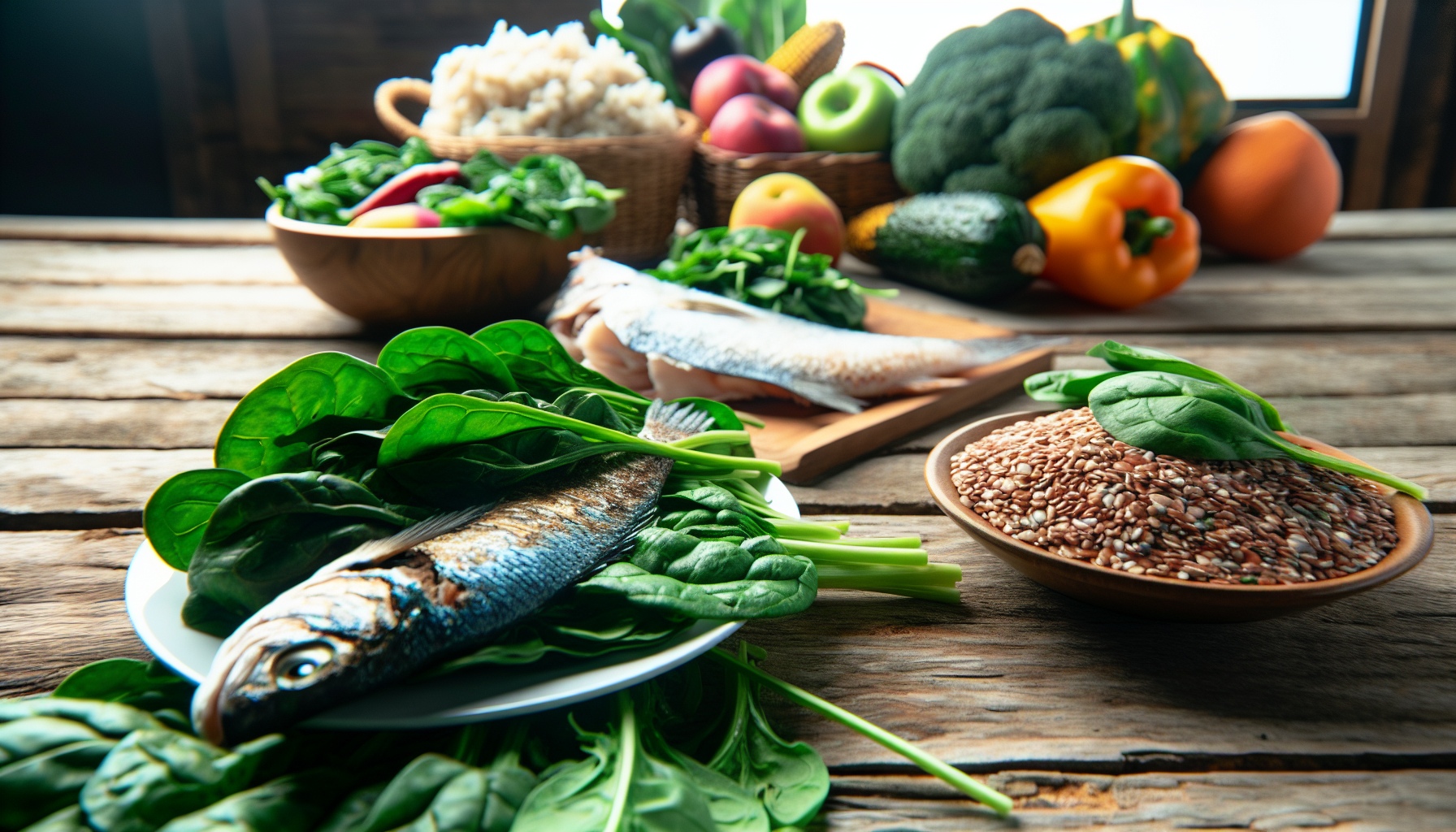Your Optimal Daily Intake: How Many Calories Should I Eat Daily?
Calories are at the heart of weight management, but “how, how many calories, should I eat daily?” is a common question. Cut through the clutter with this straightforward guide, which factors in your specific lifestyle and physiological attributes to determine your ideal caloric intake for health and balance.
Key Takeaways
Daily calorie needs vary based on individual factors including age, gender, weight, height, and activity level; consuming more calories than needed leads to weight gain, while fewer calories lead to weight loss.
Effective strategies for weight management include creating a calorie deficit by consuming fewer calories and burning more through exercise, practicing portion control and mindful eating, and choosing nutrient-dense foods over empty calories.
It’s vital to balance meal distribution throughout the day and consider the role of snacks and liquid calories in overall calorie intake; a balanced diet ensures essential nutrients are consumed, and consulting a professional can provide tailored dietary advice.
Understanding Your Caloric Needs
Fuel your body with the right calories! Understanding your daily caloric needs is essential for a healthy weight. Factors like age, gender, weight, height, and activity level play a role. It's more than counting calories; it's about a balanced lifestyle. For personalized guidance, consult a healthcare professional.
Consuming the right amount of calories is crucial for keeping a healthy weight and overall wellbeing. Knowing just exactly how many calories your body needs varies depending on age, gender, height, activity level, etc. Eat fewer daily calories than what your body requires to function optimally and you’ll start losing weight as the stored fat in your body gets used up by it for energy production. On the contrary, if you eat more daily calorie intake than necessary then extra energy will get stored inside mostly as fat resulting in increased weight gain. Hence one should strive to consume just enough calories based on their lifestyle so that they can sustain ideal health conditions at all times!
Before diving into caloric calculations and dietary adjustments, it's important to remember that these considerations should ideally be made under the advisement of a trained healthcare professional. They can provide personalized guidance based on your unique health profile and needs.
Age and Gender
Age and gender have a major impact on deciding the amount of calories you require daily. As we get older, our metabolism slows down meaning that fewer calories are necessary compared to when we are younger. Typically, men need significantly more calories than women due to their bigger body size and muscle mass.
For maintaining a healthy weight, it is generally recommended that cisgender females aim for a daily calorie intake of around 2000 calories. However, this is not a one-size-fits-all number. It can vary based on individual factors such as activity level, age, and metabolic rate. If your goal is to lose weight, it's not just about counting calories. It's also important to consider other factors, including your sex and age, and to aim for a balanced diet. Remember, healthier eating habits are not just about restriction, but about creating a sustainable lifestyle.
Weight and Height
Your weight and height significantly determine your body composition and daily caloric needs. For individuals who are taller or heavier, more energy is required for basic bodily functions, such as regulating heartbeat and brain activities, even at rest. As a result, these individuals need to consume a larger number of calories than those with a lower body mass index (BMI) to maintain their current size or weight. [Frankenfield]
If the goal is to gain size, one would need to consume even more calories above their average requirement. Conversely, if the objective is to slim down, reducing caloric intake below this standard amount could create a calorie deficit, leading to weight loss. [Hall] However, it's crucial to note that reducing intake too drastically can slow down metabolism, leading to less effective results. [Müller]
Activity Level
The amount of calories we use is increased when our physical activity levels are higher. This means those who engage in more activities need to take in additional amounts of energy, or calories, to keep up with their lifestyle. It’s possible to estimate how much you need based on factors such as intensity and frequency. For instance, a more physically active woman may require 2200 daily compared to 1800 which might be sufficient for someone less physically engaged.
Maintaining an awareness around your own level of exertion can help adjust calorie intake appropriately if it’s desired that weight gain (or loss) takes place.
Strategies for Weight Loss and Maintenance
Understanding your daily caloric needs is vital, and combining balanced nutrition with portion control sets the stage for effective weight management. Craft a path to sustainable weight loss through mindful meal prep.
Calculating your daily calorie needs is essential when trying to meet sustainable weight loss objectives. In order to reach these goals, it’s necessary to consume fewer calories than what the body requires in its current state and exercise regularly. This will help create a deficit of calories that can lead you towards achieving healthy weight loss results. Taking portion control into consideration helps ensure this process runs effectively as consuming less than what’s needed by the body produces positive outcomes such as maintaining or losing pounds efficiently!
Creating a Calorie Deficit
To lose weight, it’s necessary to establish a calorie deficit. When you consume fewer calories than your body burns, the result will be losing weight. For healthy results while shedding pounds, it is recommended that daily calorie consumption should have a 500-calorie shortfall which could lead to one pound per week of loss over time. To achieve this goal, work on reducing what you along with increasing physical activity levels so not only can important nutrients still be attained, but also the quality of those calories taken in too!
Portion Control and Mindful Eating
Maintaining a healthy weight can be achieved by controlling portions. This means being aware of appropriate serving sizes, eating balanced meals and not exceeding them to avoid excessive calorie intake. Mindful eating is essential for successful weight loss as it involves paying attention to your hunger cues, savoring each bite slowly and focusing on the experience during meal times instead of overeating mindlessly. Practicing these tips helps keep caloric consumption under control while fostering a better relationship with food overall.
Incorporating Exercise
For weight control and management, regular exercise is extremely important. Participating in physical activity helps burn off calories that can’t be cut from diet alone. It gives other benefits such as elevating one’s mood, increasing energy levels and cutting the possibility of chronic illnesses developing over time.
The number of minutes to work out depends on an individual’s goals. For those hoping to lose extra pounds, 150 mins a week at moderate intensity or 75 min/week with higher force are recommended according to research results. Muscle strengthening training has also been proved beneficial since it boosts metabolism thus burning more calories eventually leading up to successful bodyweight loss journey.
Balancing Your Meals: Breakfast, Lunch, and Dinner
Fuel your day with strategic nutrition! Breakfast, a key player, should range between 300-400 calories with a mix of whole grains, lean proteins, and fruits. Lunch steps in with 400-600 calories, emphasizing lean proteins, whole grains, and veggies. Cap it off with a light dinner of 400-600 calories, focusing on lean proteins, whole grains, and ample veggies. Balance is the recipe for success!
When it comes to food and calorie intake, the healthy way that you distribute your energy throughout the day is important. Eating meals can help keep hunger at bay while preventing overeating. Some people choose to have larger portions earlier in their day. Others opt for several smaller snacks instead of full-on sit down meals. No matter which approach works best for you, a nutritious breakfast with a lunch that has balance are key when structuring out meal planning basics – top off each night’s eating plan by going light on dinner time calories!
Breakfast Calorie Recommendations
Breakfast is considered to be the most critical meal of the day since it helps jumpstart your metabolism and aids in curbing eating urges during other parts of the day. To ensure that you get a balanced breakfast, focus on consuming between 300-400 calories combined with whole grains, lean protein sources such as hard boiled eggs or low fat milk along with fruits or vegetables. For instance, a slice of wholegrain bread paired with an egg plus one apple makes for great morning nutrition! Making sure there are adequate calories can give energy throughout whatever lies ahead during your daily routine.
Lunch Calorie Guidelines
At lunchtime, focus on consuming around 400-600 calories. This meal should keep you satiated until dinner without causing drowsiness in the afternoon. A healthy option could be a combination of lean protein (such as chicken or fish), an entire grain such as brown rice/quinoa, and numerous vegetables.
If dining out is your only choice, consider going for salads with grilled meat like chicken/salmon added to it or veggie wraps made from whole grain bread. Avoid fast food items since they are typically high in caloric intake yet low nutrient contents. The main objective here isn’t just staying within calorie limits, but also eating nutritiously so that energy levels remain steady throughout the day!
Dinner Calorie Considerations
Dinner should be the most modest meal of your day, containing around 400-600. If you consume an abundant amount of food late in the night, it can cause indigestion and hinder a good sleep. Plus, if you don’t do any physical activity at that hour, those extra calories are going to get stored as fat instead.
A sensible dinner should include lean proteins such as fish or tofu. Some whole grains and plenty of vegetables for a full nutritional content balance. If after all that sustenance still feels hunger pangs opt for fresh fruit over sweet treats when picking dessert options! Make sure to finish eating at least three (3) hours before bedtime, allowing enough digestion time so everything gets processed correctly by our bodies.
The Role of Snacks and Liquid Calories
Nourish your body wisely! Snack on nutrient-packed choices like fruits, veggies, and nuts to maintain a healthy metabolism. Keep liquid calories in check by opting for water with a twist of fruit or herbal infusion. Smart choices every calorie at a time!
One’s daily calorie intake consists of not only the three main meals, but also snacks and beverages. To avoid overconsumption, it is crucial to pick nutrient-rich options in sensible amounts. Sugary drinks are a major source of secret calories too, so one should take these into account when trying to maintain their desired calorie count or needs per day. It is key that people recognize every single calorie counts whether from a full meal or snack. Wise decisions with regards to food and beverage choices can ensure all desires without exceeding our caloric limits for the day! Also understanding how cleverly snacking works as well as being mindful of liquid calories will be imperative components when tracking down your nutritional consumption like number your required amount by focusing on daily goals such as ‘daily calory needs’.
Snacking Wisely
Healthy eating plans can include snacks, as long as you opt for nutrient-dense options. Fruits and vegetables, nuts, and seeds all provide your body with essential vitamins without contributing too many calories to your diet. They help sustain a healthy metabolism while also preventing overindulgence at meal times. Portion control is key when snacking on healthy snacks, so make sure not to exceed 100-200 calories per snack. Here are some examples of appropriate treats: munching on an apple smeared in almond butter or having a cup of cherry tomatoes accompanied by a small piece of Parmigianino cheese works well, and handfuls of mixed nuts tend to be very satisfying!
Liquid Calories
When it comes to calories, liquid ones can add up quickly and contribute to weight gain. Drinks such as soda, fruit juice and alcohol contain large amounts of sugar but minimal nutritional value. When we consume beverages high in calories instead of solid foods, the feeling of fullness is less evident, which results in more caloric intake overall.
To avoid those sugary drinks try water infused with fruits or herbs for better flavor. Also black coffee or unsweetened tea are great alternatives that have no added sugars nor many extra empty calories like other options do. When having alcoholic drinks, opt for lower-calorie choices - dry wine glasses would be preferable over beer (the light variant being a wiser option).
The Importance of a Balanced Diet
Fueling your body right! Dive into a plate of nutrient-rich goodness – fresh fish, greens, and whole grains. Managing weight isn't just about counting calories; it's about choosing wisely. Opt for high-quality, fiber-rich options to support your health journey.
Managing your weight involves monitoring the amount of calories consumed, but it’s also essential to consider what types of foods are being eaten. A balanced diet ensures that you’re giving your body all the necessary nutrients for optimal functioning. To attain this type of eating plan, make sure to include a variety from each food group - fruits, vegetables, lean proteins and whole grains with healthy fats while keeping away or minimizing intake on items full of unhealthy lipids and added sugars yet lacking proper nutrition content. Keeping track of total calories used is vital as well as making sure those calories come from nutritious sources too!
Nutrient-Dense Foods
Nutrient-dense foods are a great way to lose or maintain weight as they contain high-quality calories and all the important vitamins, minerals, complex carbohydrates, lean proteins and healthy fats needed for good health. Examples of these nutrient rich foods include fish, lean meats, whole grains, fruits vegetables and low fat dairy products.
These types of food not only provide essential nutrients but also help with calorie control making them ideal for those wishing to watch their waist line. So when thinking about your next meal plan try incorporating some nutrient dense items! Keep in mind that including variety is key for helping reach health goals such as managing one’s weight.
Avoiding Empty Calories
Too much consumption of high-calorie food items that have no nutritional value can cause weight gain and deficiencies in nutrients. These so called ‘empty calories’ often consist of sugary drinks, cakes, cookies and pastries.
It’s okay to treat yourself occasionally, but it is important to maintain balance when consuming these foods. Instead focus on eating whole meals with lots of vitamins which will benefit your health rather than decrease it. Don’t forget moderation!
Weight management relies heavily on the amount of empty calories one intakes. Paying attention to their intake should be a priority for maintaining good physical fitness levels as well as overall wellbeing too!
The Importance of Fiber-Rich Foods
Fiber is a crucial nutrient that aids in digestion, helps control blood sugar levels, and contributes to feelings of fullness, which can aid in weight management. Foods rich in fiber include fruits, vegetables, whole grains, and legumes.
Incorporating these fiber-rich foods into your diet can help you maintain a healthy weight by reducing your overall calorie intake. This is because fiber-rich foods tend to be more filling, which can lead to less calorie consumption throughout the day.
Moreover, fiber-rich foods are generally lower in calories and packed with essential nutrients, making them a great choice for those looking to maintain a healthy calorie intake while also ensuring their body gets the nutrients it needs.
Remember, when increasing your fiber intake, do so gradually and drink plenty of water to prevent digestive discomfort.
Consult a Professional: Tailoring Your Caloric Intake
When it comes to managing your weight through caloric intake, receiving personalized advice from a professional is the best course of action. A registered dietitian or healthcare provider can take into account various factors like age, sex and physical activity level as well as other specific details about your medical history and dietary restrictions when designing an appropriate eating plan just for you.
Before making any big changes to what you eat, consulting with a specialist first would be beneficial in order to ensure that not only will these alterations help achieve optimal bodyweight but also contribute positively towards overall wellbeing. After all, even if the aim may be aesthetic appeal at face value, general health should always remain priority number one!
Now while this guide provides useful guidance on basic weight management principles, taking recommendations tailored specifically for each individual’s unique requirements into consideration could prove invaluable long-term results wise. So consider speaking with someone qualified today!
Summary
Ultimately, it is essential to know the exact amount of calories you need for your body in order to stay healthy and manage weight. Eating a proper number of calories everyday from nutritious foods is just as important as what type of food they come from. Limit unhealthy “empty” calories. When figuring out daily calorie intake, take into account individual characteristics such as age, gender, height and current level of activity. Establishing positive lifestyle habits like maintaining good nutrition and exercising are more beneficial than temporary changes that may be short-lived when trying to either lose weight or gain weight healthily.
Frequently Asked Questions
How many calories should I eat a day to lose weight?
For safe and effective weight loss, it's generally advised to reduce your daily caloric intake. This typically entails a reduction between 1,300 and 1,800 calories, which is about 500 calories less than what's needed to maintain your current weight. This approach could lead to a weight loss of up to 1 pound per week. [Mayo Clinic Staff]. However, it's crucial to note that these changes should be made under the supervision and guidance of a healthcare professional or a dietitian to ensure a safe and healthy weight loss journey.
Is it healthy to eat 1,200 calories per day?
Consuming only 1,200 calories per day may be detrimental to one’s health and is generally considered insufficient for the body to function optimally. A more appropriate average daily calorie intake for most people, regardless of gender, is around 2,000 calories. This level is recommended to maintain good physical health, as opposed to following an unhealthy low-calorie diet plan.
How do I calculate how much calories I should eat?
To figure out the number of calories you should consume, take your current weight and multiply it by 15 as a rough guide to determine how many calories are needed to sustain that same weight.
How many calories should I eat at breakfast to lose weight?
Aim to consume 300-400 calories in your breakfast for successful weight loss. Eating the right combination of macronutrients will help you achieve this goal and maintain good overall health.
What factors influence my daily caloric needs?
Your daily caloric needs are strongly influenced by various characteristics such as gender, age, and weight. All these elements have an essential role in ascertaining your particular calorie demands.
References
Frankenfield D, Roth-Yousey L, Compher C. Comparison of predictive equations for resting metabolic rate in healthy nonobese and obese adults: a systematic review. J Am Diet Assoc. 2005 May;105(5):775-89. doi: 10.1016/j.jada.2005.02.005. PMID: 15883556.
Hall KD, Kahan S. Maintenance of Lost Weight and Long-Term Management of Obesity. Med Clin North Am. 2018 Jan;102(1):183-197. doi: 10.1016/j.mcna.2017.08.012. PMID: 29156185; PMCID: PMC5764193.
Müller MJ, Enderle J, Bosy-Westphal A. Changes in Energy Expenditure with Weight Gain and Weight Loss in Humans. Curr Obes Rep. 2016 Dec;5(4):413-423. doi: 10.1007/s13679-016-0237-4. PMID: 27739007; PMCID: PMC5097076.
Disclaimer
This content is intended for informational purposes only and is not meant to serve as medical or clinical advice or to replace consultation with your healthcare provider or medical professional. Always seek professional advice for any questions regarding your health and dietary needs.





